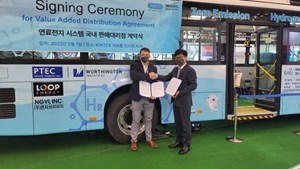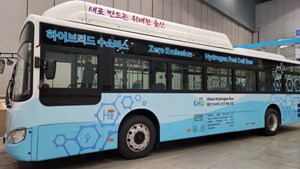News
Loop Energy and NGVI launch H2-electric transit bus for Korean market
Loop Energy, a designer and manufacturer of H2 fuel cells, announces its customer, NGVI Inc., unveiled its H2-electric transit bus platform at H2 Meet in Seoul. The bus will begin trials with local fleet operators within the next few weeks.
Working with the Loop Energy integration team, NGVI successfully retrofitted a diesel bus platform into a zero-emissions urban transit bus. The 11-meter bus with a capacity of 46 passengers is powered by a Loop Energy 60-kW fuel cell and has completed the vehicle homologation process for Korea.
The new bus platform will now undergo trials with Korean fleet operators to demonstrate the range of benefits H2-electric transit buses can deliver in the field. The continuation of the two companies’ relationship aims to help NGVI to continue to grow in the dynamic Korean bus market. NGVI is well positioned within the South Korean bus market, with Seoul Bus company and TCHA Partners having a share of ownership.
“We would like to congratulate NGVI on launching their first hydrogen-electric bus, and we look forward to working together to develop more zero-emissions vehicles for the Korean market in the future,” said Loop Energy Chief Commercial Officer, George Rubin. “With trials beginning shortly, we are excited for this platform to demonstrate how we can provide a high-performing solution for transit operators. From the onset, we felt that NGVI’s unique understanding of Korea’s fleet operators’ needs combines perfectly with our leading-edge technology to develop a successful platform for this exciting market.”
“We are pleased to continue our relationship with Loop Energy and look forward to supporting the integration of their fuel cells into vehicles throughout Korea,” said NGVI CEO, David Jung. “South Korea has identified hydrogen-electric vehicles as an effective pathway to replace diesel vehicles without sacrificing performance and drastically increasing costs, and the timing of our new bus launch aligns with the local push for fuel cell bus adoption in Korea.”
As part of its transition to net zero, South Korea has developed a clear roadmap to deploy 60,000 H2-electric buses by 2040. The government is supporting OEMs and fleet operators by providing incentives for manufacturers to receive subsidies of up to 70% per battery-electric bus and up to 85% per H2-electric bus.
While attending H2 Meet for the bus unveiling, Loop Energy was also awarded the H2 Innovation Award for its eFlow technology.



